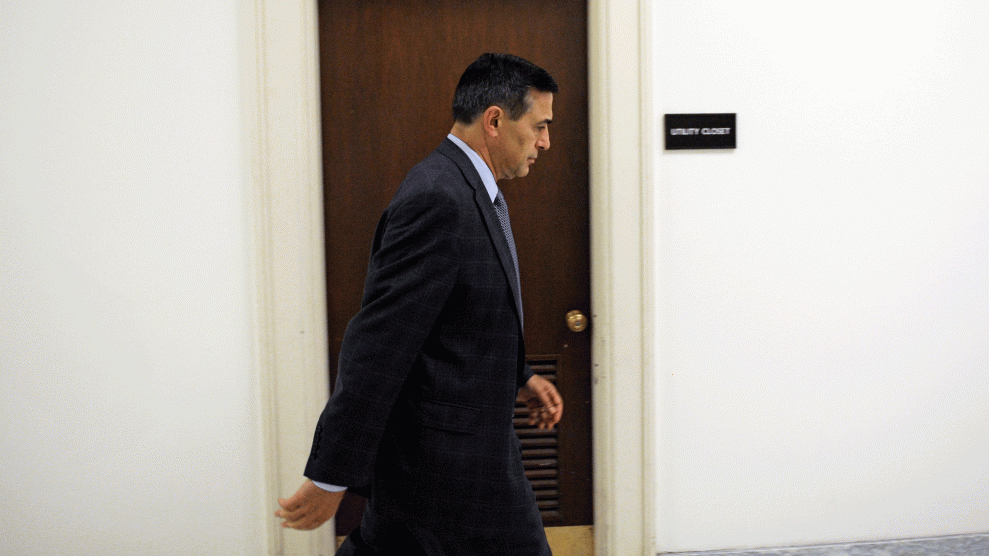
Rep. Darrell Issa returning to the House Oversight Committee's offices in June 2013.Cliff Owen/AP
For the first time, Rep. Darrell Issa (R-Calif.) had to work to keep his seat. On Tuesday, he eked out a narrow victory against his Democratic challenger, Doug Applegate, beating him 51 to 49.
Even as Donald Trump sailed to victory, he may have helped weaken Issa’s grip on California’s 49th district, where the wealthiest member of Congress has served effectively unchallenged for 16 years. Back in February, Issa warned that Trump could have a toxic effect on down-ballot Republicans seeking reelection. Issa even suggested that Trump could be “a national Todd Akin” for the wider Republican Party. Then, against his own advice, he embraced The Donald and joined Trump’s national security advisory board on the same day that the world heard Trump bragging about grabbing women “by the pussy.”
In his seven previous elections, Issa didn’t even have to put out yard signs, so safely insulated was he in the Republican-leaning district that spans northern San Diego County and southern Orange County, an expanse of golden sand beaches and coastal bluffs that has long been the realm of highly educated, well-off white people. “Darrell never participated before. He’s never been involved in our Republican campaigning, because he was so safe,” Republican Oceanside Councilman Jerry Kern told me earlier this month.
But redistricting in 2012 and a growing Latino population has slowly pulled the region leftward. In this ridiculous election year, Trump left plenty of the area’s Republicans without a top-of-the-ticket contender to rally behind. An August poll found that Trump had a 60 percent unfavorable rating in Issa’s district. Another showed Hillary Clinton with a 14-point lead. Yet Jason Roe, a San Diego-based political consultant, said he was skeptical of Trump’s threat to candidates like Issa. “Do people vote based on that? I don’t think voters are holding down-ballot Republicans accountable for Trump,” he said.
Applegate came out of nowhere to trail Issa by just five points in the June primary. It could have been a wake-up call, but the message didn’t seem to reach Team Issa. His campaign was described as “mystifyingly bad” and incredibly slow. “It’s being run like a 1980s campaign,” Francine Busby, the chair of the San Diego Democratic Party, told me in late October. “He hasn’t been visible and active.” The campaign didn’t start running ads until October. One political operative described them as “the worst fucking TV ads I’ve ever seen in my life.”
In the few weeks running up to the election, Issa suddenly went into full campaign mode. He rode his bicycle throughout the district, stopping for photo ops; he attended private fundraisers and visited a food bank and the Camp Pendleton Marine Base. One thing he never did, however, was withdraw his support for Trump. And that decision has paid off. “You gotta remember: Darrell outdid Romney in the district,” Oceanside Councilman Jerry Kern told me. “I’m sure he’ll outdo Trump this time.” Sure enough, Trump took just 39 percent of the vote in San Diego County and 44 percent in Orange County.












